
Elapidae is a family of snakes characterized by their permanently erect fangs at the front of the mouth. Most elapids are venomous, with the exception of the genus Emydocephalus. Many members of this family exhibit a threat display of rearing upwards while spreading out a neck flap. Elapids are endemic to tropical and subtropical regions around the world, with terrestrial forms in Asia, Australia, Africa, and the Americas and marine forms in the Pacific and Indian Oceans. Members of the family have a wide range of sizes, from the 18 cm (7.1 in) white-lipped snake to the 5.85 m king cobra. Most species have neurotoxic venom that is channeled by their hollow fangs, and some may contain other toxic components in various proportions. The family includes 55 genera with around 360 species and over 170 subspecies.

Hydrophiinae is a subfamily of venomous snakes in the family Elapidae. It contains most sea snakes and many genera of venomous land snakes found in Australasia, such as the taipans (Oxyuranus), tiger snakes (Notechis), brown snakes (Pseudonaja) and death adders (Acanthophis).

Hydrophis schistosus, commonly known as the beaked sea snake, hook-nosed sea snake, common sea snake, or the Valakadeyan sea snake, is a highly venomous species of sea snake common throughout the tropical Indo-Pacific. This species is implicated in more than 50% of all bites caused by sea snakes, as well as the majority of envenomings and fatalities.
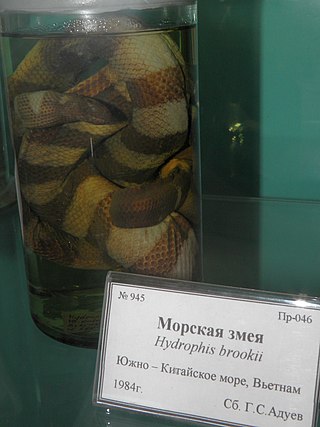
Hydrophis brookii is a species of venomous sea snake in the subfamily Hydrophiinae of the family Elapidae. The species is native to bodies of water in Southeast Asia.

Hydrophis caerulescens, commonly known as the dwarf sea snake, is a species of venomous sea snake in the family Elapidae.
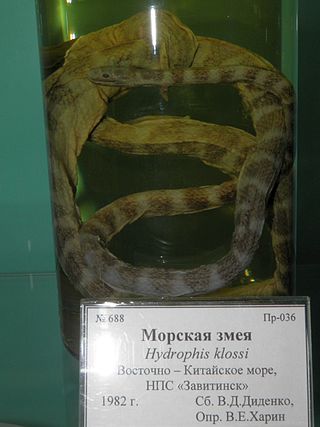
Hydrophis klossi, commonly known as Kloss's sea snake, is a species of sea snake in the family Elapidae. Like all other sea snakes, it is venomous. The species is endemic to the Indian Ocean.
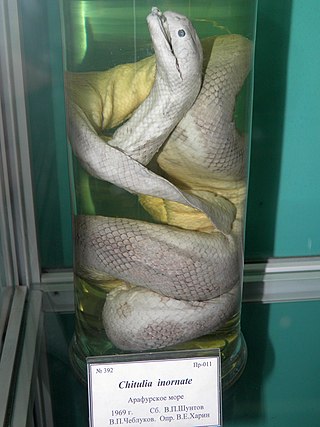
Hydrophis inornatus, commonly known as the plain sea snake, is a species of venomous sea snake in the family Elapidae.

Hydrophis melanocephalus, commonly known as the slender-necked sea snake, is a species of venomous sea snake in the family Elapidae.
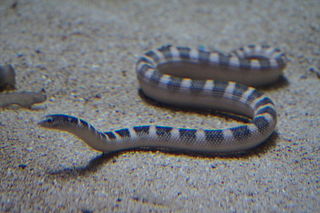
Hydrophis ornatus, commonly known as the ornate reef sea snake, is a species of venomous sea snake in the family Elapidae.

Hydrophis curtus, also known as Shaw's Sea Snake, short sea snake, but often includes Hydrophis hardwickii is a species of sea snake. Like most Hydrophiinae sea snakes, it is a viviparous, fully marine, and front fanged elapid that is highly venomous. It is collected for a variety of purposes including human and animal food, for medicinal purposes and for their skin.

Sea snakes, or coral reef snakes, are elapid snakes that inhabit marine environments for most or all of their lives. They belong to two subfamilies, Hydrophiinae and Laticaudinae. Hydrophiinae also includes Australasian terrestrial snakes, whereas Laticaudinae only includes the sea kraits (Laticauda), of which three species are found exclusively in freshwater. If these three freshwater species are excluded, there are 69 species of sea snakes divided between seven genera.

Sea kraits are a genus of venomous elapid sea snakes, Laticauda. They are semiaquatic, and retain the wide ventral scales typical of terrestrial snakes for moving on land, but also have paddle-shaped tails for swimming. Unlike fully aquatic ovoviviparous sea snakes, sea kraits are oviparous and must come to land to digest prey and lay eggs. They also have independent evolutionary origins into aquatic habitats, with sea kraits diverging earlier from other Australasian elapids. Thus, sea kraits and sea snakes are an example of convergent evolution into aquatic habitats within the Hydrophiinae snakes. Sea kraits are also often confused with land kraits , which are not aquatic.

Hydrophis peronii, commonly known as the horned sea snake, Peron's sea snake, and the spiny-headed seasnake, is a species of venomous snake in the subfamily Hydrophiinae of the family Elapidae. The species is endemic to the western tropical Pacific Ocean. It is the only sea snake with spines on the head. It is sometimes placed in its own genus Acalyptophis.

The yellow-bellied sea snake is a venomous species of snake from the subfamily Hydrophiinae found in tropical oceanic waters around the world except for the Atlantic Ocean. For many years, it was placed in the monotypic genus Pelamis, but recent molecular evidence indicates it lies within the genus Hydrophis.

Vladimir Yemelyanovich Kharin (1957–2013) was a Russian zoologist, ichthyologist, herpetologist, and a specialist in sea snakes.

The slender-necked sea snake, also known commonly as Cogger's sea snake, is a species of marine venomous snake in the subfamily Hydrophiinae of the family Elapidae. The species is native to waters around western Australia and the southern Pacific Ocean.
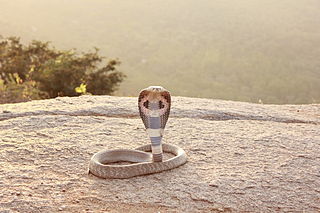
The Elapoidea are a superfamily of snakes in the clade Colubroides, traditionally comprising the families Lamprophiidae and Elapidae. Advanced genomic sequence studies, however, have found lamprophiids to be paraphyletic in respect to elapids, and anywhere between four and nine families are now recognized.

Hydrophis czeblukovi, also known commonly as the fine-spined sea snake, the geometrical sea snake, and the geometrical seasnake, is species of venomous snake in the subfamily Hydrophiinae of the family Elapidae. The species is native to waters off northern Australia.
The estuarine sea snake, also known commonly as Kharin's sea snake, is a species of marine venomous snake in the family Elapidae. The species is native to waters around the northern tip of Australia in the Torres Strait.
Laticauda guineai is a species of venomous sea snake in the family Elapidae. The species, which was first described by Heatwole, Busack and Cogger in 2005, is native to waters off southern New Guinea.















